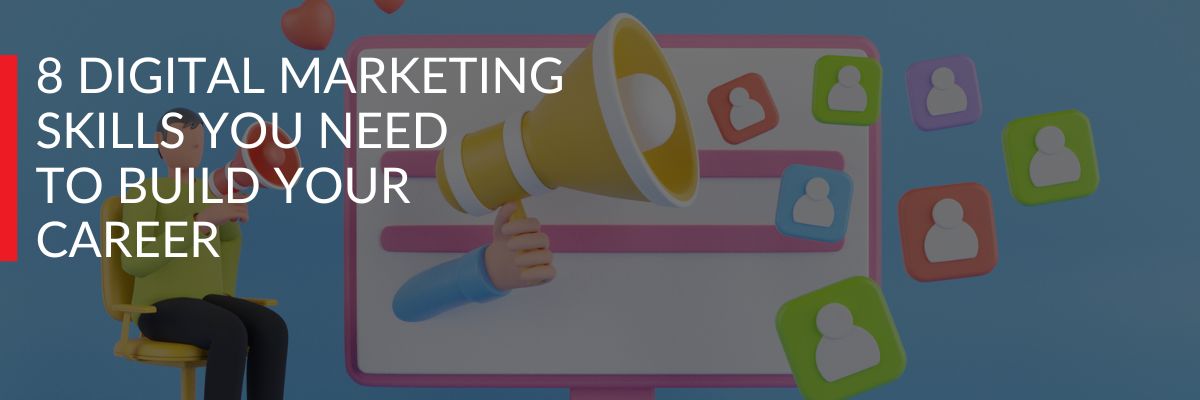The digital marketing world is broad and fast-moving. New trends and technologies emerge almost overnight, which can make it difficult to know where to focus your time and energy.
From understanding how social media platforms work to improving search visibility and building campaigns across multiple channels, there’s plenty to get to grips with.
The upside is that demand for digital marketers remains strong, especially for those with adaptable skills and a solid understanding of how technology, including AI, is shaping the industry.
A recent report from Epsilon found that 94% of businesses already use AI in some form within their marketing processes. Of those who haven’t, most expect to adopt it soon.
For marketers, staying relevant means building a mix of technical and strategic skills. Here are eight areas worth focusing on to help grow your career.
1. Data & Analytics
Data helps marketers understand what’s working and where to improve.
Tools like Google Analytics (GA4) and Google Tag Manager make it possible to track website traffic, campaign performance, and user behavior. But collecting data is only part of the job - you need to be able to draw useful insights and apply them to improve future campaigns.
Even small businesses often have large amounts of data available. Knowing how to analyse and interpret it will make you more valuable to your team.
It’s also worth exploring alternative analytics tools to find what works best for your needs.
2. Social Media
Social media helps businesses build communities, promote products, and reach new audiences.
But success isn’t just about posting regularly. It involves:
- Choosing the right platforms
- Creating content that fits your audience
- Tracking performance and adjusting your approach
For example, TikTok might work well for a lifestyle or fitness brand targeting younger consumers, while LinkedIn is better suited to B2B marketers building professional networks.
Understanding how different platforms work and where your audience spends time will help you make the most of social media.
3. Email Marketing
Email remains one of the most reliable marketing tools, especially as access to third-party data becomes more restricted.
It allows marketers to communicate directly with people who have shown interest in a product or service. Tools like Mailchimp, HubSpot, and Omnisend make it easy to manage email lists, automate workflows, and track engagement.
Using more advanced tactics such as segmented email lists, triggered campaigns and personalised messaging help to improve open rates and conversions.
For example, someone who downloads a guide from your website can be added to a relevant email sequence based on their interests, ensuring that they receive more tailored communications going forward.
4. SEO & SEM (Search Engine Optimisation & Marketing)
SEO and SEM help businesses get found online through search engines like Google and Bing.
Search Engine Optimisation (SEO) focuses on improving a website to drive organic (unpaid) traffic. Search Engine Marketing (SEM) combines both organic and paid strategies such as pay per click (PPC) advertising.
While some technical aspects of SEO can be left to specialists, understanding how search engines work and what influences rankings is important for any marketer. It is also important to note that search is evolving, with AI playing a growing role in how information is delivered. Features like Google’s AI Overviews can affect how brands appear in search results, so keeping an eye on these developments is useful.
5. Video Marketing
Video remains a key part of how brands connect with audiences online. In 2024, people in the US spent an average of 52 minutes per day watching videos on social platforms. That number is expected to grow over the next few years.
Marketers continue to see results from video content. Wyzowl’s latest research shows that 93% of marketers say video delivers a positive return on investment, though results can vary depending on content quality and distribution.
Short-form video, product explainers, social media clips, and testimonials are among the most popular formats. Tools like Camtasia, CapCut, or beginner-friendly platforms such as iMovie can help you create video content without relying on a full production team.
It’s also worth learning basic video SEO principles to help your content get discovered on platforms like YouTube or TikTok.
6. AI and Automation
Automation tools are widely used to help marketers manage repetitive tasks, run campaigns, and personalize customer experiences.
AI is now integrated into many marketing platforms, providing features like predictive analytics, automated bidding for ads, chatbot support, and personalised content recommendations.
Survey Monkey reports that more than half of marketers say their companies are actively adopting AI tools, with most expecting this to grow.
Practical applications include:
- Analysing campaign performance
- Automating email marketing
- Optimising paid advertising
- Improving SEO
- Lead scoring and sales automation
- Generating content ideas
Getting familiar with AI tools, even at a basic level, will help you stay current as these technologies become standard.
7. Design Thinking & Planning
Design thinking is about solving problems by focusing on user needs.
In marketing, this means understanding how people interact with your content, website, or product, and then making decisions that improve their experience.
It helps to know the basics of visual design, including:
- Color theory
- Typography
- Layout and composition
- Brand consistency
Good design supports brand recognition and keeps marketing materials consistent across different platforms.
8. Content Marketing
Content drives almost every part of digital marketing, from websites to emails to social posts.
Creating good content requires an understanding of your audience, clear messaging, and attention to search visibility. A simple way to stay consistent is by developing content pillars. These are core themes that all your content links back to.
Marketers also use AI writing tools like ChatGPT, Claude, and Perplexity to help with idea generation or first drafts. These tools can save time, but editing and human oversight remain essential.
Content takes many forms, including:
- Blog articles
- Social media posts
- Video scripts
- Email newsletters
- Whitepapers
- E-books
The more formats you’re familiar with, the more flexible you’ll be in the workplace.
Digital Marketing moves quickly, but having a solid foundation will help you stay adaptable and relevant.
The DMI Pro certification covers all eight of these skills in depth, with practical, expert-led training designed to help you apply them in the real world.
Whether you’re new to the industry or looking to sharpen your existing skills, the DMI Pro certification can help you build confidence and stay competitive.






